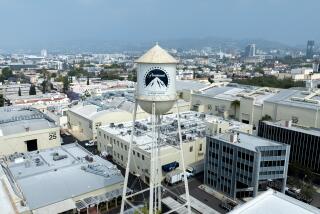Blockbuster to Buy Video Library for $6.4 Million
- Share via
SAN DIEGO — Blockbuster Entertainment Corp. has agreed to acquire 53% of Video Library, San Diego County’s home-grown videocassette rental company, in a deal valued at $6.4 million, the companies said Tuesday.
Blockbuster also said it will conduct a $4-per-share tender offer for Video Library’s remaining shares. The offer is expected to commence Monday.
For the record:
12:00 a.m. Feb. 18, 1988 For the Record
Los Angeles Times Thursday February 18, 1988 San Diego County Edition Part 1 Page 2 Column 6 Metro Desk 2 inches; 40 words Type of Material: Correction
A headline in Business Wednesday incorrectly stated that Blockbuster Entertainment Corp. had agreed to buy Video Library for $6.4 million. Actually, Blockbuster agreed to buy 53% of the company for that amount, and plans to conduct a $4-a-share tender offer for the remaining shares.
Video Library, which closed Monday at $3.75, went public in 1985 at $3 a share. It operates 43 company-owned stores in San Diego County.
Blockbuster, a fast-growing, publicly traded videocassette rental company, will acquire 1.6 million shares owned by Video Library President and Chief Executive Barry L. Rosenblatt, Chairman Roy K. Black, and shareholder Pauline Sussman. The three will receive Blockbuster stock valued at $6.4 million.
Blockbuster Chairman and Chief Executive H. Wayne Huizenga, who became a controlling shareholder of the Fort Lauderdale-based company in early 1987, was one of the founders of Waste Management Inc., a Chicago-based waste disposal company. He left that company in the early 1980s, according to a Waste Management spokesman.
Rosenblatt will remain as president and CEO of Video Library and will assume the additional title of senior vice president for Blockbuster Management Group.
Blockbuster operates 133 company-owned and franchised Blockbuster Video Superstores in 23 states.
Video Library’s 43 retail locations generally are much smaller than Blockbuster’s 6,000-square-foot “superstores.” The larger stores hold as many as 13,000 tapes, according to Blockbuster Vice President Thomas A. Gruber.
Video Library reported an $893,320 net profit and $11.9 million in revenue for the third quarter ended Sept. 30.
Blockbuster reported a $4-million net profit and $43.2 million in revenue for the year ended Dec. 31. It reported a $938,000 net loss and $7.4 million in revenue for 1986.
The company, which had 19 stores at the end of 1986, now has 73 company-owned stores and 60 franchised stores.
Blockbuster might close some smaller Video Library stores because “they don’t meet our requirements as far as an ability to carry the number of tapes that we carry,” Gruber said. However, consumers will not notice immediate changes in San Diego County during the coming months, Gruber said.
“Video Library has dominated (San Diego) for some time, and we don’t want to lose (business) there by not having a smooth transition,” Gruber said.
Around the country, larger video rental chains have been gobbling up smaller competitors, producing “stores that are bigger, better, cleaner and brighter,” Gruber said. “It’s not unlike the late 1950s and early 1960s when supermarkets (began to dominate) a network of corner grocery stores.”
Blockbuster was the nation’s fourth-largest video rental company during 1987, according to Santa Ana-based Video Store Magazine. Springfield, Va.-based Erol’s, with $154.7 million in 1987 revenue, was the nation’s largest rental company, according to the magazine.
More to Read
The biggest entertainment stories
Get our big stories about Hollywood, film, television, music, arts, culture and more right in your inbox as soon as they publish.
You may occasionally receive promotional content from the Los Angeles Times.










